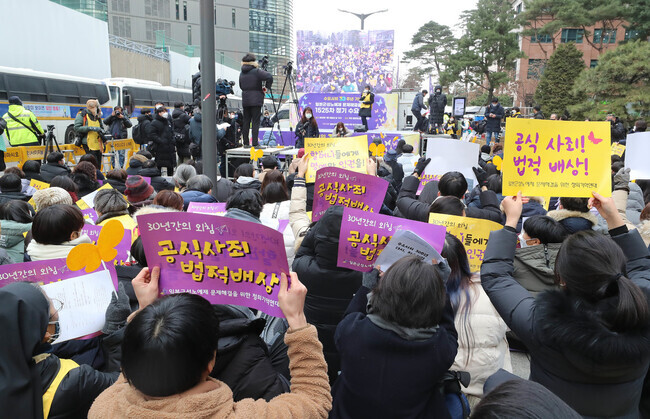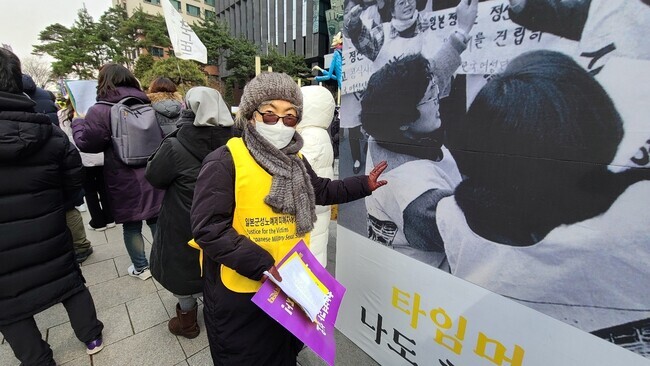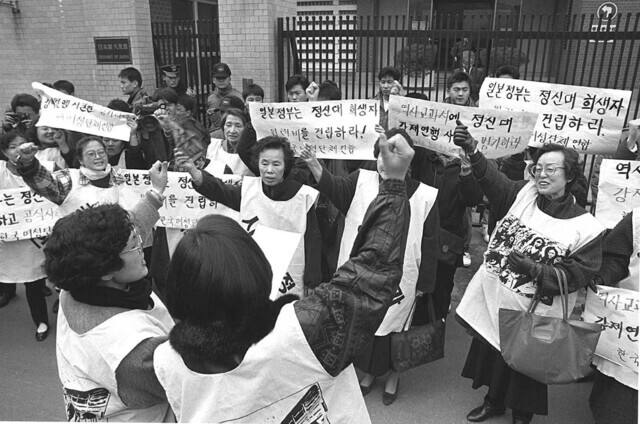hankyoreh
Links to other country sites 다른 나라 사이트 링크
[Reportage] 30 years of “comfort women” rallies mark world’s longest peace protest

On Wednesday, activists marked the 30th anniversary of the weekly Wednesday Demonstrations that have demanded that Japan issue an apology for its policy of wartime military sexual slavery, also known as the “comfort women” issue. The 1,525th Wednesday Demonstration was held in front of the former Japanese Embassy in Seoul’s Jongno District at noon.
Present at the demonstration was 79-year-old first-generation South Korean women’s rights activist Yoon Young-ae, who pointed at a picture from the first-ever Wednesday Demonstration held on Jan. 8 of 1992 on display at the site.
“That’s me,” she said, smiling.
Yoon is a women’s rights activist who first started the Wednesday Demonstrations along with the late Kim Hak-soon, the first survivor of the “comfort women” system to publicly testify about the horrors of Japan’s military sexual slavery in 1991.
“I still feel the conviction and passion I felt at the first Wednesday Demonstration 30 years ago. When we first started protesting, I thought the demonstration would die out quickly. I never knew it would continue for 30 years. Watching the young women’s rights activists of today fills me with deep inspiration,” Yoon said.
Unprecedented in its longevity, the Wednesday Demonstration is the longest-running peace protest in the world, renewing its title with each weekly rally. For Wednesday’s rally, 200 protestors ranging from youth human rights activists to white-haired first-generation activists, as well as regular citizens, gathered near the Statue of Peace, a statue of a Korean girl memorializing victims of sexual slavery by the Japanese military.
The protestors celebrated the 30-year journey of peace that the Wednesday Demonstration has maintained and pledged to demand a resolution to Japan’s military sexual slavery issue with unwavering conviction. Like always, demonstrators held up signs that read, “We have been shouting for 30 years; we demand an official apology and legal compensation,” urging the Japanese government to apologize to victims of the “comfort women” system.

Despite the day’s historic significance as the 30th anniversary of a protest demanding justice for victims of Japan’s military sexual slavery, the Korean Council for Justice and Remembrance for the Issues of Military Sexual Slavery by Japan, a Korean non-governmental organization that has advocated for redress for the “comfort women” issue, was not able to hold its demonstration directly in front of the Statue of Peace as it historically has. This was because far-right organizations have been claiming the demonstration site in front of the State of Peace as their own since May of 2020, holding counterprotests to the Wednesday Demonstration every week.
This was the case on Wednesday as well, with 20 or so far-right activists including those from the Freedom Union shouting, “The ‘comfort women’ issue is a lie.”
Having been harassed by such right-wing organizations for over a year, an association of support groups for survivors of Japan’s military sexual slavery filed a petition with the National Human Rights Commission of Korea prior to the demonstration. The group asked for relief efforts, saying, “We denounce the police, who have neglected to act on the human rights violations, violence, and hate being witnessed during the Wednesday Demonstrations.”
The Wednesday Demonstrations began after the late Kim Hak-soon publicly testified of her experience as a survivor of Japan’s “comfort women” system for the first time on Aug. 14, 1991, when 30 or so members of the Korean Council first demonstrate in front of the Japanese Embassy in Korea on Jan. 8, 1992. The rally has been going strong weekly for 30 years except in the wake of the Kobe earthquake in Japan in 1995. It is the world’s longest-standing rally. Even during the thick of the COVID-19 pandemic, when restrictions on protests were put in place, the Wednesday demonstration continued on through single-person protests.
“Comfort women” survivors who were unable to join the demonstration in person due to COVID-19 concerns met with the protestors through video.
Lee Ok-seon, a 95-year-old survivor, said, “[Protestors] have had to [demonstrate] sitting on the ground, rain or snow. They have gone to much trouble for the Wednesday Demonstration.”

Lee Yong-soo, a 94-year-old survivor, said, “I felt so thankful watching demonstrators who have been participating [in the rally] and speaking up for 30 years. Despite this, Japan still continues on with its thoughtless remarks. The ‘comfort women’ issue should be resolved through the United Nations Convention against Torture.”
President of the Korean Council Lee Na-young took to the stage, saying, “The insult and pain [of Japanese military sexual slavery] has been healed through 30 years of solidarity and love, and world citizens have joined the ‘comfort women’ survivors’ journey against colonialism and imperialism. Until the day the issue of sexual slavery by the Japanese military is resolved, we will stand here on Peace Street shouting out [for justice.]”
Blue House spokesperson Park Kyung-mee shared South Korean President Moon Jae-in’s word of gratitude as well: “From those who bravely testified to the world about the Japanese military’s policy of wartime sexual slavery to those who have helped the Wednesday Demonstration reach its 1,525th rally, thank you for your efforts.”
By Lee Ji-young, staff reporter
Please direct questions or comments to [english@hani.co.kr]

Editorial・opinion
![[Column] Has Korea, too, crossed the Rubicon on China? [Column] Has Korea, too, crossed the Rubicon on China?](https://flexible.img.hani.co.kr/flexible/normal/500/300/imgdb/original/2024/0419/9317135153409185.jpg) [Column] Has Korea, too, crossed the Rubicon on China?
[Column] Has Korea, too, crossed the Rubicon on China?![[Correspondent’s column] In Japan’s alliance with US, echoes of its past alliances with UK [Correspondent’s column] In Japan’s alliance with US, echoes of its past alliances with UK](https://flexible.img.hani.co.kr/flexible/normal/500/300/imgdb/original/2024/0419/2317135166563519.jpg) [Correspondent’s column] In Japan’s alliance with US, echoes of its past alliances with UK
[Correspondent’s column] In Japan’s alliance with US, echoes of its past alliances with UK- [Editorial] Does Yoon think the Korean public is wrong?
- [Editorial] As it bolsters its alliance with US, Japan must be accountable for past
- [Guest essay] Amending the Constitution is Yoon’s key to leaving office in public’s good graces
- [Editorial] 10 years on, lessons of Sewol tragedy must never be forgotten
- [Column] A death blow to Korea’s prosecutor politics
- [Correspondent’s column] The US and the end of Japanese pacifism
- [Guest essay] How Korea turned its trainee doctors into monsters
- [Guest essay] As someone who helped forge Seoul-Moscow ties, their status today troubles me
Most viewed articles
- 1[Column] The clock is ticking for Korea’s first lady
- 2[Column] Has Korea, too, crossed the Rubicon on China?
- 3After 2 months of delayed, denied medical care, Koreans worry worst may be yet to come
- 4US overtakes China as Korea’s top export market, prompting trade sanction jitters
- 5[Editorial] When the choice is kids or career, Korea will never overcome birth rate woes
- 6[Correspondent’s column] In Japan’s alliance with US, echoes of its past alliances with UK
- 7Hong Se-hwa, voice for tolerance whose memoir of exile touched a chord, dies at 76
- 8Nearly 1 in 5 N. Korean defectors say they regret coming to S. Korea
- 9John Linton, descendant of US missionaries and naturalized Korean citizen, to lead PPP’s reform effo
- 10Strong dollar isn’t all that’s pushing won exchange rate into to 1,400 range